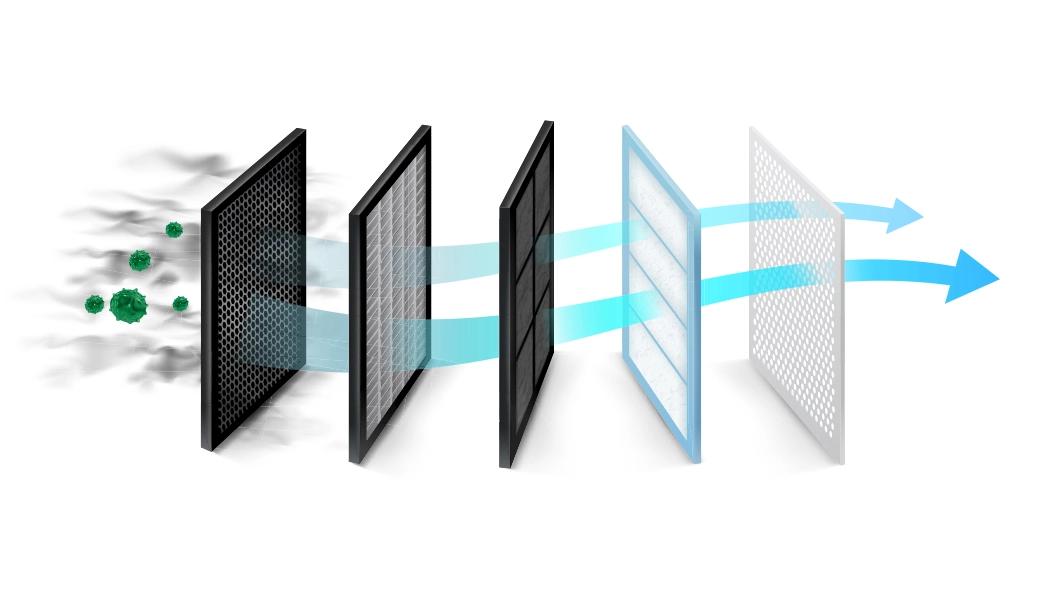Shop by

Do HEPA filters actually remove viruses, including COVID-19, from the air? Is it possible for HEPA air filters to play a role in curbing infections from communicable diseases like COVID-19?
HEPA stands for “high efficiency particulate air”. A HEPA filter is able to trap and remove microscopic particles, like COVID-19 viruses from the air. In that sense, a HEPA air filter can protect against COVID-19 from spreading to someone from an infected person. However, as the EPA has noted, it takes a multi-pronged approach to combat COVID and other viruses.
The following is a quick guide on how HEPA filters can play a role in preventing infections by helping keep viruses out of the air.
HEPA air filters work like other air filters, they just purify the air more efficiently. HEPA is technically a category of air filter based on the size of particulate media and percentage of particles that can be removed from the air when passing through the filter.
A true HEPA filter can remove at least 99.7% of particles that are 0.3 microns in size or larger. Some HEPA air filters can also remove smaller particles as well. A HEPA air filter physically traps particles as circulating air passes through a pleated screen of filtration material. The particles remain trapped in the screen’s fibers until the filter is cleaned or replaced.
There are four types of HEPA filters:
Medical grade HEPA filters have the highest rating for filtration. This type of HEPA filter has a grade of H13-H14, which indicates the filter can remove 99.95% to 99.995% of particles that are just 0.1 micron in size.
A true HEPA filter isn’t as powerful as a medical grade HEPA filter, but it meets the HEPA classification in removing at least 99.7% of particles that are 0.3 microns. True HEPA filters have a grade of H10-H12.
Any filter labeled “HEPA Type” is not a true HEPA filter. They may remove the vast majority of particles from the air but they have not been proven to remove at least 99.7% of 0.3 micron particles.
These also don’t meet the qualifications of an actual HEPA air filter. Like HEPA Type, this labeling is nothing but advertising that’s meant to entice the buyer.

We know from past research that air filters with a high enough degree of filtration can reduce the number of viral contaminants in the air. That’s proven to be the case with viruses such as SARS and is believed to be the same with many other viruses, including COVID-19.
The COVID-19 virus is most commonly spread through droplet transmission, but the virus can be airborne when moisture particles from the mouth or nose are released into the air. When a virus is spread through the air it’s known as aerosol transmission.
Aerosol particles are much smaller than droplets. This is a challenge for several reasons:
Viral bio-aerosol particles are typically 0.3 to 100 microns in diameter. The 1-10 microns range is of greatest concern to COVID-19 researchers.
HEPA air filters are able to effectively remove nearly all particles as small as 0.1 microns out of the air by capturing 99.7% of particles that are 0.3 microns and an even higher percentage of larger particles. Because of its particulate trapping qualities, HEPA air filters are an effective line of defense in combating the spread of COVID-19 within indoor environments.
Like all products, some HEPA filters are better at combating viruses, bacteria and germs than others. Here’s a look at some of the best HEPA filters and purifiers for viruses and other potentially harmful contaminants.
Honeywell is a top manufacturer of HEPA air filters for their top-rated air purifiers. The Honeywell True HEPA Allergen Remover Air Purifier is a popular choice that comes in five sizes for spaces between 75 and 465 square feet.
Kenmore is well known for home appliances and HVAC systems, so it’s no surprise they’re a frontrunner in HEPA air filters.

Buyers have to be careful when they’re purchasing air filters online. If health concerns are the primary reason you want to get HEPA air filters then you want to purchase them from a highly reputable source.
An original manufacturer like Filterbuy that produces the product themselves or works with a manufacturing partner to offer customers a wider range of products is a good option. You can also get high quality HEPA air filters at big box home improvement stores, but the selection is likely to be limited.
When you choose a high quality HEPA air filter it’s an investment that should pay off. A true HEPA filter can be used in purifiers throughout the home to make the air cleaner and less contaminated. Allergy sufferers should also experience fewer symptoms, and people with asthma should find relief from respiratory problems.
In certain conditions, COVID-19 viral particles can remain in the air indoors for hours.
There have been reported cases, but it is rare. COVID-19 is much more likely to be transmitted by droplet transmission or direct contact.
You shouldn’t rely solely on an air purifier, but an air purifier with a true HEPA filter can help.
HEPA filters are the best air purifiers for viruses as a standalone device. However, HEPA filters are usually not the best option for the HVAC system. They can restrict airflow too much, putting the equipment at risk and reducing energy efficiency. Instead, use a MERV 13 air filter. An air filter with a MERV 13 rating can remove 98% of airborne particles as small as .3 microns.